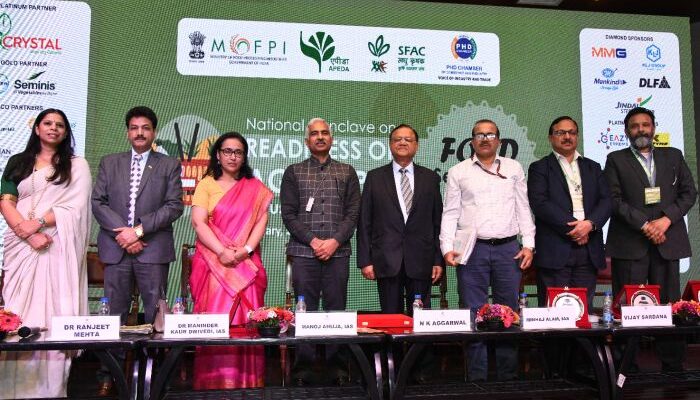New Delhi: Secretary, Department of Agriculture and Farmers Welfare, Government of India, Manoj Ahuja emphasised the significance of meeting farmers’ requirements for knowledge and assurance regarding seeds, pesticides, and fertilisers, as well as the collective responsibility of ensuring quality standards with support from both industry and the government. He was speaking at PHDCCI Conclave on ‘Readiness of Agri Input Industry for Ensuring Food Security by 2047,’ held on Monday at PHD House, New Delhi.
Furthermore, he stressed the approach towards reducing chemical pesticide usage and boosting agricultural resilience to climate change. He advocated for leveraging global linkages in landholding practices while tailoring solutions to local conditions, aiming to equip farmers with optimal knowledge and practices to enhance their global competitiveness. Transparency and technological support were also suggested by him as pivotal aspects.
Regarding government initiatives such as the SATHI initiative, Ahuja outlined efforts to introduce traceability in seed inputs to enhance transparency without imposing cumbersome protocols. He urged industry stakeholders to empower farmers by disseminating product information through QR codes and similar means, promoting informed decision-making. Additionally, he proposed establishing a code of ethics for the seed and pesticide sector to uphold prescribed standards.
You may also like to read – Corteva Agriscience launches Salibro nematicide to combat crop-damaging nematodes in India
Ahuja also emphasised the importance of a decentralised infrastructure to ensure quality assurance, advocating for platforms like Pradhan Mantri Krishi Samridhi Kendra and NABL-accredited private sector labs. Recognising the necessity of educating farmers on efficient pesticide utilisation, he highlighted efforts to make international molecules and markets accessible to them.
Addressing the PHDCCI Conclave, Dr. Maninder Kaur Dwivedi, Additional Secretary, Department of Agriculture and Farmers Welfare and Managing Director, Small Farmers Agri-Business Consortium (SFAC) highlighted the significant demand within the formal agricultural input sector, particularly in seed supply chains where private companies play a vital role. However, she noted challenges in seed distribution, stressing the importance of licensing and formal distribution channels to ensure accessibility, particularly in remote villages.
Dr. Dwivedi emphasised the need for processing and manufacturing facilities to minimise seed losses. She called for a re-evaluation of existing farmer collectives’ networks to enhance the provision of agricultural inputs in rural areas.
You may also like to read – SOLASTA Bio takes green bioinsecticides closer to market with successful field trials
Dr. Dwivedi further highlighted the urgency for formal companies to aggressively target underserved areas to prevent the emergence of informal players. She cautioned against the risks associated with informal market penetration, citing examples where pesticide and insecticide distribution faced challenges in specific regions.
While talking about food security, challenges and opportunities, Minhaj Alam, Additional Secretary, Ministry of Food Processing Industries (MoFPI), Government of India, said, that our journey towards ensuring food security by 2047 demands selective action across the agriculture industry. We need to incentivise agriculture to ensure farmers continue farming and overcome the challenges they face. By addressing challenges, seizing opportunities, and fostering social cooperation, we can pave the way for a resilient and sustainable food system that meets the needs of each generation.
Dr. Ranjeet Mehta, Executive Director, PHDCCI, discussed the critical importance of the government’s support for agriculture and farmers, particularly in ensuring food security for both India and the global community. Dr. Mehta proposed a comprehensive approach to enhancing agricultural productivity, encompassing innovation in agricultural technologies, the development of resilient infrastructure to confront challenges, adaptation to climate change, leveraging digitisation and data analytics, and fostering global collaboration through supportive policies. He encouraged stakeholders from the industry to contribute additional suggestions which PHDCCI will send to the government to further strengthen the agriculture sector’s support from the Indian government.
You may also like to read – BioPrime AgriSolutions gears up for microbial revolution with breakthrough strains and advanced formulations
NK Aggarwal, Chair, Agribusiness Committee, PHDCCI and and Chairman, Crystal Crop Protection Limited, emphasised the necessity for collaboration among various segments of society, including farmers, industries, and policymakers, to achieve common agricultural goals. He underscored the significance of crop protection, farm mechanisation, and farmer education, noting the critical need for improved awareness about micronutrient management to enhance crop quality and overall agricultural productivity. Addressing specific challenges such as black thrips and black fungus, he advocated for concerted efforts between the government and industry to tackle such issues. Aggarwal reaffirmed India’s commitment to prioritising agriculture and the welfare of its farmers, projecting that by 2047, India would be capable of providing high-quality food and ensuring food safety on a global scale.
Vijay Sardana, Technological Expert, Advocate, Supreme Court of India and Chairman, Kisan Vigyan Foundation (KAKV) in his address highlighted two recent developments. Firstly, he discussed the latest European grain deal, which mandates a significant reduction of 50 per cent in chemical pesticide usage, emphasising its regulatory impact. Secondly, he addressed the Artificial Intelligence Act of the European Union. He also emphasised the importance of enhancing resilience to these emerging challenges, signalling the need for proactive measures to adapt and respond effectively.
You may also like to read – 7 best practices for protecting crops from aphid infestation
Dr. KC Ravi, Chairman, CropLife India and Chief Sustainability Officer, Syngenta India, addressed the remarkable achievement of food grain protection, reaching a historic high of 330 million tonnes. He emphasised the substantial contribution of the input industry to this and highlighted the government’s strategic recognition of the agrochemical sector as a champion sector. Dr. Ravi stressed the urgent need to augment productivity per unit of input. Furthermore, he elaborated on the opportunities and challenges facing the crop protection industry, emphasising the development of crop medicines to combat losses from pests and insects, the growth in export opportunities, significant industry investment in technology development post-research and development, and the comparative analysis of pesticide consumption, indicating room for improvement in India compared to other countries like China, Japan, and Brazil.
Vineet Nahata, Chair, Co-operative Task Force, PHDCCI highlighted the pivotal role of cooperatives in reshaping the agricultural landscape of India. “Agriculture is the bedrock of our country and thrives on collaboration and collective endeavour, mirroring the ethos embodied by cooperatives. These entities, exemplified like IFFCO, KRIBHCO and AMUL, stand as pillars in our rural communities, uplifting farmers and driving rural economies forward,” he said. He also touched upon the government’s vision of ‘Sahakar se Samridhi’. Further, he mentioned that this move by the government aligns with efforts to rejuvenate the cooperative sector and empower small and marginal farmers by leveraging modern technology and streamlined processes.




